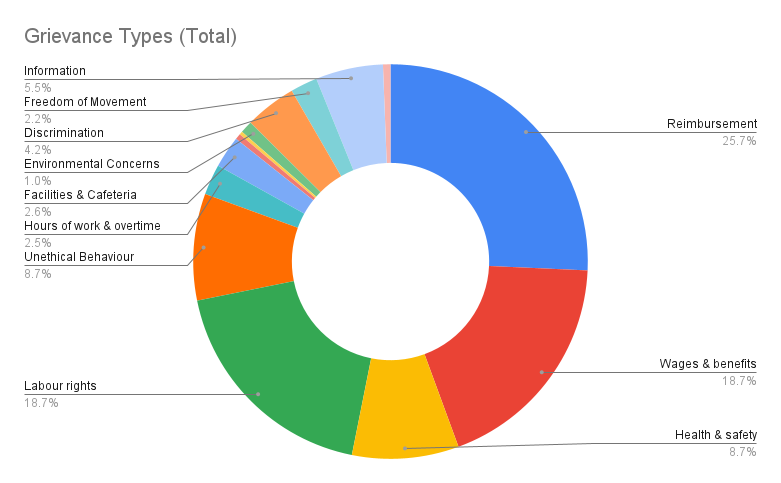The media, the public, regulators and investors are demanding better data and more effective action on human rights due diligence (HRDD) in company supply chains. However, it has been notoriously difficult for companies to obtain primary source data about these human and labor rights risks, or to measure the effectiveness of their social impact policies. For businesses to make an impact they need primary data to guide them towards the most meaningful and efficient actions and policies.
Until now, companies have had a hard time getting the primary data they need to inform their human rights due diligence (HRDD) policies. At the same time, a lack of awareness of labor or human rights issues in their supply chains leaves them vulnerable to reputational damage, and non-compliance with HRDD regulations.
Ulula is helping to bridge the data gap with an aggregated summary of the labor and human rights concerns from the anonymous worker grievance reports that their direct-to-worker communications services provide.
The Worker Voice Report: Unifying Companies and the Supply Chain
Ulula anonymized and aggregated the results of incoming worker grievances over four quarters, from Q3 of 2022 to Q2 of 2023 and across sectors like agriculture, mining, apparel and consumer goods. The report provides data on the following risk indicators:
- Reimbursement payment,
- Wages & benefits,
- Information,
- Health & safety,
- Labour and legal rights,
- Unethical behavior,
- Hours of work and overtime,
- Facilities,
- Freedom of movement & work,
- Corruption & fraud,
- Discrimination.

Breakdown of Grievances by Type Across all Quarters (Q3, 2022-Q2,2023) and Sectors
On average, Ulula received around 450 grievances per quarter, and just under 1,500 grievances in total, with the data spanning between 2022 and 2023.
The report shows that payment reimbursement, wage concerns, and labor rights were the biggest issues for their partners’ supply chain workers over the 12 month period. Grievances related to discrimination in the workplace tended to be consistently low, as did issues with facilities.
One notable observation is that in the apparel sector, labor rights were the key concern for workers, with unethical behavior also an issue of concern. Reimbursement and wage issues were by far the top concerns for agricultural workers. In the mining sector, the greatest concern was information, the payment of wages and workplace benefits.
With mandatory HRDD legislation on the way, adopting a model of continuous engagement with workers, transparency and ongoing measurement of progress towards commitments and targets will be an essential part of any meaningful action on HRDD risks.
Building an HRDD policy requires data that shows worker’s everyday realities , not just when it’s auditing time. Gathering data from the source means businesses can take effective action and set up grievance systems that work for workers.
Achieve HRDD Compliance with a Worker-Centric Approach to HRDD
Ulula’s Digital Human Rights Due Diligence services provide the primary source data and end to end grievance case management tools that companies need to meet upcoming HRDD reporting requirements, satisfy stakeholder transparency demands, and avoid human and labor rights issues in the supply chain.
Ulula’s bespoke, automated and scalable service gathers continuous insights from workers themselves. Ulula’s tools are designed with workers’ situations in mind, ensuring high levels of engagement. They’re technologically agnostic, and can be rolled out easily on the devices workers actually use, in the languages that they speak. Workers can raise issues privately, without needing to go to an intermediary, use a factory telephone, or get permission from management. This way, worker engagement happens with the utmost credibility and trust.
Ulula’s HRDD risk assessment and grievance processes produce data that stakeholders can rely on. The results from Ulula’s grievance reports can be fed directly into stakeholder risk mitigation efforts. The data is presented in a shareable dashboard designed to ease grievance resolution, case management, and the inclusion of different stakeholders along the supply chain.
The inclusion of worker voice with real-time, two-way communication on HRDD matters is a turning point for the way companies can deal with HRDD risks in their supply chains, and will be fundamental to compiling the social impact reports of the future.
The way that human and labor rights risks in the supply chain are managed is changing. It’s never been simpler to get the data you need to make an impact. Lead the change for your organization by getting in touch with us. Just fill out the form below.

